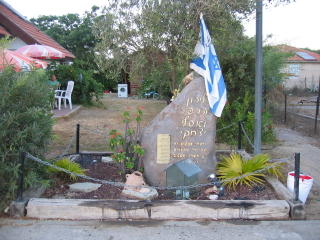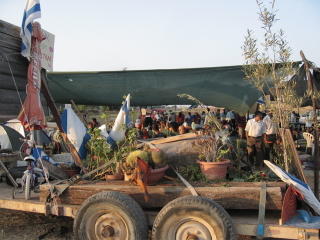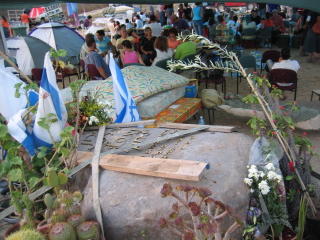Camped out in a dirt lot by the highway near Yad Mordechai, a major junction near Gaza, the refuseniks demand immediate relocation to temporary housing and eventual resettlement on a strip of pricey beachfront. They won’t even visit a hotel to take showers, for fear the government would make media hay of how it’s providing access to running water. For now, they drink and wash from water tanks.
Surrounded by dome tents and vehicles, the heart of the encampment is about 100 feet by 60, its edges loosely defined by a shade cloth hanging over the dusty jumble of camp cots, sleeping bags, chairs, pets, and people. Lots of people. During the day, adults argue and pray and slumber, and their kids fight and play and read, and everywhere hangs a haze of despair and anger. I haven’t visited a Palestinian refugee camp, but there must be similarities. Where the Palestinians have little choice, however, these Jews are exaggerating their straitened circumstances to shame the government into surrendering better land and treatment to them than anybody else is getting.
But what parent willingly subjects children to such misery and uncertainty? I watched a little girl, maybe nine years old, fussing over a cockatoo. She’d hold it and kiss it, whisper to it, feed it seeds from her palm, even dunk its reluctant head into a styrofoam cup to make it drink. Occasionally she cried, silent and poker-faced as tears ran down her dusty cheeks. At those moments she’d crush the cockatoo to her own birdlike little chest and rock from side to side. When she let go, the bird would shake itself off, fan its clipped wings, roll its head like a boxer, and then flap back up to perch on her shoulder. The girl’s mother lay on a nearby cot, staring at the sky through shade cloth, waiting.
I visited Elei Sinai a week before the evacuation. In any town, a few streets define the perimeter. In settlements, these margins form a frontier on the frontier where houses overlook razor-wire fences and then the hostile land beyond. Not many years ago, Palestinian intruders killed a young woman and her boyfriend on one of Elei Sinai's edge streets. Her father and the town commemorated her memory with an enormous boulder that stood at the perimeter of a sideyard facing the spot where she'd died.
At the perimeter of the Yad Mordechai encampment, I found an open trailer loaded with bric-a-brac: houseplants, lamps, abstract sculptures, framed portrait photos, and some wilting bouquets. In the center, almost hidden by the thicket of mementos, lay the dead girl's monument, on its back, facing the sky.
A dog lay in the dust, tethered to the trailer by a short leash and ignoring the dirty stale bread by his water bowl. I'm usually quick to lecture neglectful pet owners, but words failed me.

August 11, 2005



No comments:
Post a Comment